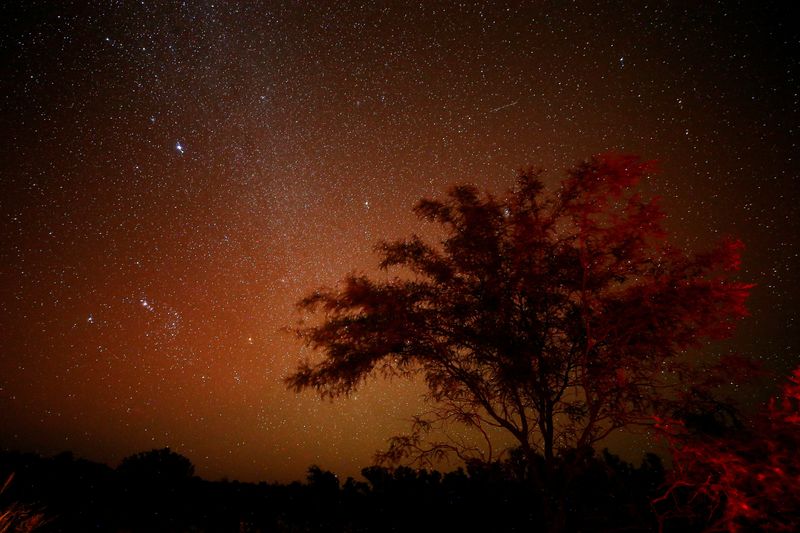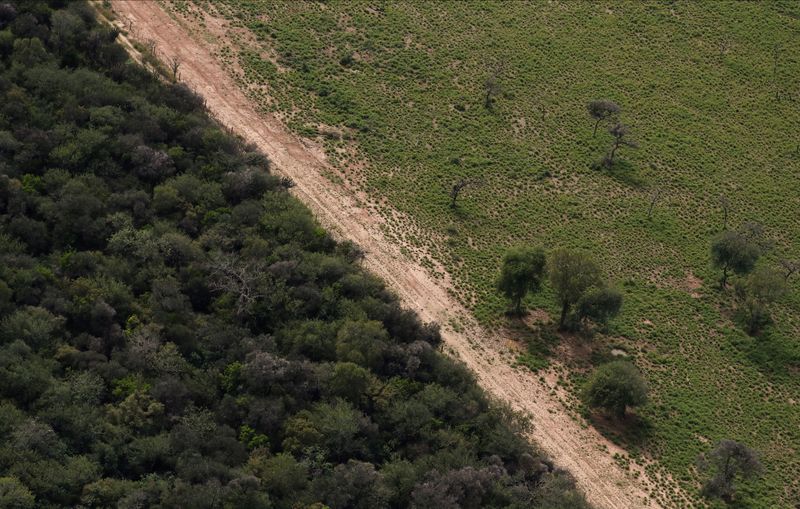By Agustin Marcarian
GRAN CHACO, Argentina (Reuters) - In the vast Chaco forests of northern Argentina, Noole rests from the fierce sun in the scented shade of dark carob trees on a small farm where her family grows watermelons and potatoes to eat or sell at market.
For Noole, an Indigenous Pilaga, and her brother Jose Rolando Fernandez, the trees set the natural rhythm of life, providing food, water and cool in this sparsely populated and remote corner of South America that is home to the continent's second largest woodland after the Amazon (NASDAQ:AMZN).
But that habitat is facing growing pressures as trees are removed to make way for large-scale farms of soy and cattle to meet global food demand.
An impending new trade deal between South America's Mercosur bloc and the European Union could mean more exports from the Gran Chaco and more land clearance - although the EU is likely to attach stringent rules to restrict deforestation.
"We, the Pilaga, are very affected by land clearing. Because clearing leads to drought. The trees themselves play an important role in the environment," said Noole, 53, who lives in the Gran Chaco near the sleepy city of Las Lomitas.
Jose said their connection to the trees was almost spiritual. "We greatly appreciate the carob tree. For us, it's our relief," he said as he worked on the farm, planting potatoes for the season.
As well as providing sustenance and shade, the trees support an ecosystem of myriad animal and plant species, said Noole, whose skin is weathered by the sun, her silver-streaked hair pulled back in two braids.
"The native forest has a function that we have to value," she said. "Indigenous people believe that our home is the land. The earth is our mother because we produce and eat from it."
The Gran Chaco, bordered by the Andes mountains to the west and the Parana and Paraguay rivers to the east, is a region twice the size of California that spans Argentina, Paraguay, Bolivia and Brazil.
Land clearances to farm soy and beef have led to some 7 million hectares of native forest being torn down in Argentina between 1998 and 2021, almost all in the Gran Chaco, government data show. That's an area almost 90 times the size of New York City.
Reuters witnessed trees being felled by bulldozers and cattle roaming over arid land on a trip through the Gran Chaco, an important carbon sink often overlooked, given the prominence of the Amazon rainforest to the north.
Many countries have importation rules in place meant to deter illegal deforestation and Argentina enacted a forest law in 2007. But local officials said regional enforcement could be patchy and low fines were often not enough of a deterrence.
Teofila Palma, a farmer in the Gran Chaco who was tending her goats when Reuters visited, said clearances nearby in recent years had made an obvious impact on the local microclimate.
"Since the clearing took place, the temperature is even higher. And the wind sweeps in from the north without anything to stop it."
Mariela Soto, a small-scale farmer from Pozo de Mortero, said that many local producers had lost animals because logging meant that "the soil was eroding and pasture no longer grows."
Some locals, however, cite the importance of farming exports in job creation and development in a region where half the population lives in poverty, often eking a living from the land selling traditional artisan products or taking on informal work.
"To condemn deforestation is to condemn people to poverty," said Juan de Hagen, a veterinarian and farm manager also from Las Lomitas. He said he hoped the EU deforestation laws would not mean Gran Chaco residents paid the price economically.
"The European Union should abide by the laws of each Mercosur country," de Hagen said on the farm he oversees. "Europe cleared all its land and is not paying any penalty."

For Noole, global trade deals and far-away regulation take little notice of people like her, despite their potential to disrupt the natural drumbeat of her life.
"The agreement is for the economic and business world," she said. "For us as an Indigenous community, the reality is that we are not part of these agreements. We were never in the negotiations. They never took us into account."
